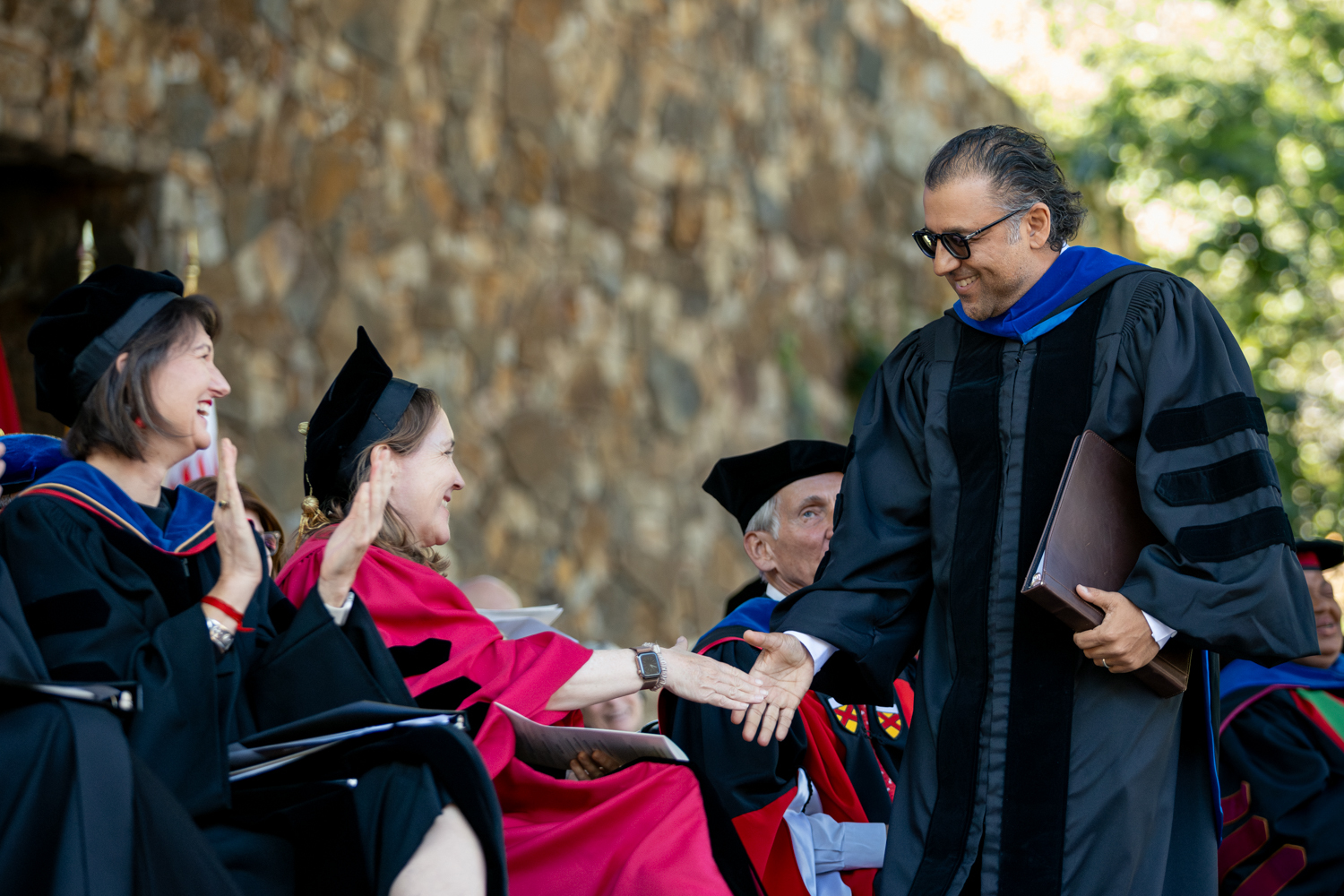Giving joy, especially when the world needs it most, is an action all of us can take, said Varun Soni, keynote speaker at Stanford’s Baccalaureate ceremony. The student-led commemoration, which took place Saturday at Frost Amphitheater, acknowledges the spiritual rewards of education and is organized by the Office for Religious and Spiritual Life.
Harry Gregory and Kurt Hickman
Soni, who is the dean of religious and spiritual life at the University of Southern California, began his address to graduating seniors by acknowledging that the state of the world today – mired in multiple crises – makes this a commencement season “unlike any other.”
“And yet, as fully realized human beings, we all want to turn our pain into hope, we all want to turn our fear into love, and we all want to be part of the solution to the world’s great challenges and not part of the problem,” said Soni to an audience of nearly 1,000 graduating seniors.
Soni shared how his friend, the renowned spiritual leader Deepak Chopra, identified five pressing crises young people face today. Four of them many are familiar with: war, justice, health, and sustainability.
But there is a fifth crisis, Soni said, and it’s one that is least understood: joy.
Without addressing the crisis of joy, it is impossible to solve the other crises, Soni said, acknowledging the difficulty of feeling joy amid the other crises.
“But how do we embrace joy at a time of so much pain?” Soni asked. “We do so by realizing that even though we can’t control everything, the things that we can control are powerful beyond measure.”
Andrew Brodhead
Soni listed a few aspects of our lives we can control, including our beliefs, thoughts, perceptions, and values.
“We can control how kind we are, how grateful we are, how much effort we exert, how much time we spend worrying or not worrying, and how we judge or don’t judge others,” Soni said. “And most importantly, we can control how many times we say “I love you” to the people we love.”
Making joy a mindset
Soni is an interfaith leader and the first Hindu to serve as the lead chaplain on a U.S. college campus. His call for joy was inspired not only by Chopra but also the teachings of the Buddha.
“[F]or the Buddha, and for all of us, joy is a mindset, joy is a birthright, and most importantly, joy is a choice that we make for ourselves,” Soni said.

Even though we can’t control everything, the things that we can control are powerful beyond measure.”
He also cited other religious leaders who found joy amid extraordinary pain and suffering, including the Dalai Lama and Archbishop Desmond Tutu. When the the Dalai Lama and Tutu wrote a book together, Soni observed, they didn’t call it “The Book of Suffering,” but rather “The Book of Joy.”
According to the Dalai Lama and Tutu, the way to feel joy is to give joy.
“And that’s really why we are here this morning,” Soni said. “We are here to show love for our graduating students. And we are here to give joy to each other at a time when we need it most.”
Finding home
Following Soni was Hannah Oo, biology ’24, who was selected from 41 competitive and compelling submissions to deliver the Baccalaureate student reflection.
Oo remarked how different Stanford is today compared to when she and her classmates matriculated four years ago in 2020. Due to the coronavirus pandemic, campus life at Stanford and other schools and universities across the country was upended. When Oo started classes her freshman year, learning was remote.
There were so many unanswered questions Oo remembered feeling: When would she and her classmates finally step foot on campus? Who would her friends be? What did she want to study?
When she did arrive on the Farm, she was surprised to discover that Lake Lagunita – known also as “Lake Lag” – wasn’t a lake but a dry field. Oo, who is from Michigan and grew up surrounded by lakes, had hoped to find a piece of home at Lake Lag.
As she settled into Stanford, she soon found home everywhere.
“Home suddenly became late nights in the Stacks of Green, the McMurtry rooftop, CoHo on a Tuesday afternoon while looking for a spot with an outlet, a lovely view from an EVGR double,” Oo said.
Oo remembered how it was hard for her to believe that one day, Lake Lag would be full.
“But it was,” said Oo, noting how success is possible, even when it seems unlikely.
With their whole lives ahead of them, Oo reflected on how she and her classmates face uncertainty again, but they know how to persevere through life’s unpredictability.
“There will be new things we do not know,” Oo said. “We have been prepared though, to make change and to dare. To forge our homes in the world, to build community, and to be kind.”